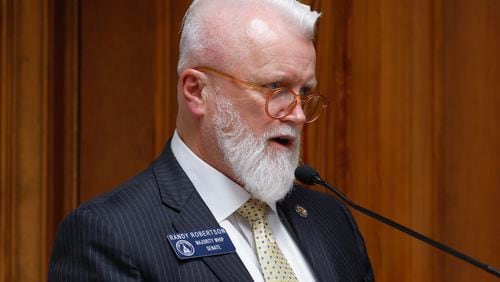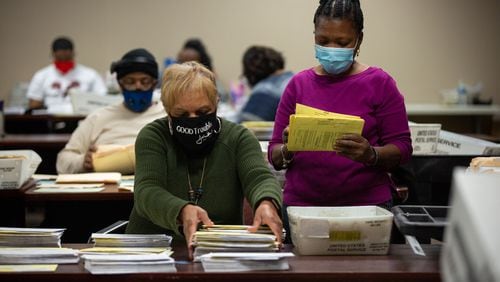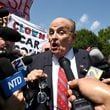Senate lawmakers voted along partisan lines early Monday morning in favor of proposals that would kick-start the process for Buckhead to secede from the city of Atlanta.
The effort is broken into two bills. SB 114 outlines details of the proposed “City of Buckhead City,” while SB 113 allows for the transfer of government services and facilities from Atlanta to a newly formed municipality.
The measures face the high hurdle of passing both legislative chambers to reach Gov. Brian Kemp’s desk, a prospect which even some Republicans see as dim given the improved city-state relations between the GOP governor and Democratic mayor.
But Monday’s vote set a new benchmark for the movement, which gained traction quickly last year and surprised opponents who once dismissed the proposals as moot. The measures were ultimately smothered in 2022 by opposition from legislative leaders.
This year, cityhood supporters see newfound momentum with Lt. Gov. Burt Jones, an early backer of the effort. Still, allies of House Speaker Jon Burns and Kemp have been lukewarm, at best, over its prospects of advancing.
If approved by the Legislature, Buckhead residents within the proposed boundaries would vote on whether to form the new city through a ballot referendum in November 2024.
Legislators on the Senate State and Local Government Operations committee, OK’d the bills after sitting through two lengthy hearings where they heard public comment on the issue.
State Sen. Randy Robertson, a Cataula Republican, who sponsored the measures, has been continuously slammed for spearheading the effort even though he represents an area more than 100 miles away. All eight other co-sponsors on the bills also live outside the city of Atlanta.
“Too many times inside this building — and especially outside this building — local community’s elected officials forget who they work for,” he said. “So when movements happen that remind the elected officials who the real bosses are, then I have to support that.”
State Sen. Jason Esteves, an Atlanta Democrat who represents portions of Buckhead, pushed back that he received a large number of votes from within the proposed boundaries of the new city which helped send him to the state Senate.
“I would respectfully submit that the people in my community have spoken when they elected me,” he said. “That’s exactly why I’m here.”
Proponents say that the bills simply let residents in the wealthy north Atlanta neighborhood have a say on whether or not they want to split from the city. Critics argue that secession would wreak havoc on Atlanta’s public services and finances and set a dangerous precedent for the state.
“What is happening today is that my constituents are being forced to eat a half baked pie,” Esteves said and rattled off a laundry list of concerns from what will happen to Atlanta Public School students who live in Buckhead to how the split could cripple the city’s bond rating.
The effort to secede stems from a handful of disgruntled Buckhead residents who feel local elected officials are not doing enough to combat high rates of violent crime — an issue that is prevalent not just in Buckhead but across Atlanta.
Savannah Democratic state Sen. Derek Mallow cautioned that the drastic split won’t make the neighborhood’s problems disappear.
“Crime won’t be solved tomorrow, the issues that have been raised about Buckhead won’t be solved tomorrow,” he said. “In fact, they’re going to take some time because when you start a new city, you’re gonna have to get it off the ground and get it sea legs and get it standing up. And what are you gonna do in the meantime?”
Tucked within the 65-page Buckhead cityhood bill are also details from how much city officials would be paid — the mayor would earn a $225,000 salary — to how much city of Atlanta assets would be sold to the new municipality. The sales price for Buckhead parks would be $100 per acre.
But there are still many unanswered questions, including how the split would impact Atlanta’s finances and what could happen to the planned $90-million public safety training center in DeKalb County.
Atlanta officials who successfully stymied the effort to secede last legislative session have been lobbying both in public meetings and behind closed doors to shut down the proposal again. Mayor Andre Dickens touts his efforts to bolster public safety in the area including opening a new police precinct.
The mayor’s office said in a statement that the Dickens was disappointed by the vote on the “short-sighted legislation” and that he’d continue to work with Senate lawmakers to end movement of the bills.
“The Mayor spent the last year building strong bonds between City Hall, the Buckhead community, and the entire city of Atlanta,” said Michael Smith, spokesperson for Dickens. “Thanks to his team’s work, crime is down, roads are being repaired and a strong majority of Buckhead residents oppose de-annexation. The Mayor has strong relationships with the Governor and other State leaders, and will continue working with them to show that the capital city thrives best as one city with one bright future.”
Before the bills are taken up by the full chamber, they have to first make it out of the Senate Rules Committee which is chaired by state Sen. Matt Brass, a Newnan Republican, who also co-sponsored both bills.
“I’ve been down here 10 years and we’ve voted on referendums to create new cities around the state,” the lieutenant governor said in a statement. “I’m not going to shut down the conversation. We’d be doing ourselves a disservice if we didn’t allow the process to try to play out.”
Staff writer Greg Bluestein contributed to this report.
What’s in the bill?
Senate Bill 113 and Senate Bill 114 get into nitty gritty details of how the proposed “city of Buckhead City” would operate, and how Atlanta will be instructed to forfeit their assets. Still, many things are left unanswered. Here’s a breakdown of some of the issues outlined in the bills and one big question mark.
- High salaries: Local officials in the new city would make staggeringly high salaries compared to both local and statewide elected officials in the Peach State. The newly minted mayor would earn a salary of $225,000 in their first year — that’s compared to Gov. Brian Kemp’s annual $175,000 salary. City council members would rake in $72,000.
- Low prices: Legislation that outlines the de-annexation process describes how Atlanta will be required to sell their existing assets to the new municipality. The bill sets the price of land for Buckhead parks at $100 per acre, including Chastain Park and Memorial Park. Fire stations would cost $5,000 each, and any Atlanta-owned buildings in Buckhead, such as schools, for $1,000. The water system serving the entire Buckhead area would be available for purchase at $100,000, while the sewer system would be sold at the same price.
- What about the training center? Under the terms outlined in S.B. 113, all of Atlanta’s assets outside city limits would be divided between the new municipalities or sold with the proceeds being divvied up on a pro rata basis. That includes the $90-million planned public safety training center that sits on 85 acres of land in DeKalb county. Critics also raise concerns that if Buckhead were to split, Atlanta would not be able to foot it’s $30-million share of the bill.







